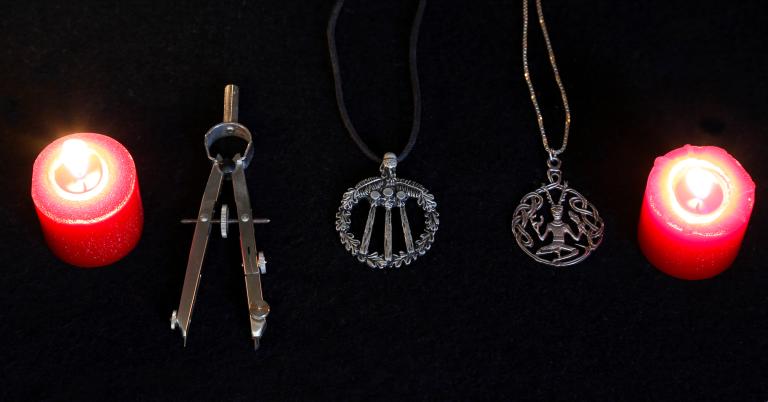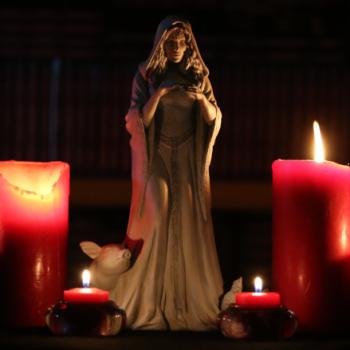It’s always encouraging to see young people take a serious interest in Pagan and polytheist religions. There are lots of young witches – and that’s a good thing – but not so many young devotees of the many Gods. I’m happy when I see anyone wanting to take their devotion deeper, and if that’s a young person, so much the better.
And that brings us to this question:
Do you have any advice for young people who are set on becoming polytheist clergy? What would you counsel a teen Pagan to do about college, seminary, and major career/life decisions?
This is a not an easy path. And it’s a path that hasn’t been traveled very much. If you want to be a Methodist minister, a Catholic priest, or a Buddhist monk, there are clear steps for how to get there. Our Pagan and polytheist communities still haven’t figured out what – if anything – we want from our clergy, much less how an individual should go about becoming clergy.
The simple answer is “just do it.” That’s rather flippant, but there’s some truth to it – start doing the work and the work will find you. Still, this is a serious question and it deserves a serious answer. One of my primary religious identities is that of priest. I’ve served as Pagan clergy for close to 20 years now. I’ve watched what my friends and colleagues have done. What follows isn’t the only way to become polytheist clergy, but it is one way, and I think, a helpful way.
And that starts with understanding what it means to be Pagan and/or polytheist clergy.
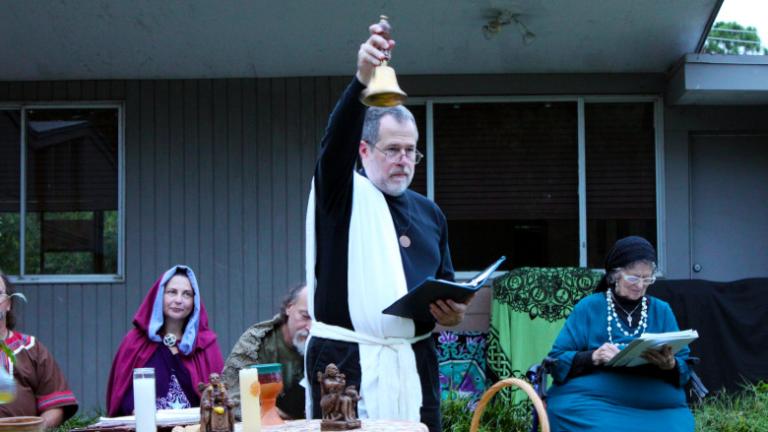
A polytheist priest is not a Christian minister
When most of us hear the word “clergy” we think of Catholic priests and Protestant ministers. They lead worship, conduct weddings and funerals, do pastoral counseling, and represent their congregations in the wider community. And most of them are full-time religious professionals.
There are very few Pagan or polytheist priests who are full-time religious professionals. All the ones I know are either writers (who live a very modest lifestyle) or they have spouses who support them financially. There is no path to independent living as Pagan clergy, nor is there likely to be in the foreseeable future.
And yet, there is always a need for clergy in a religious community. Someone has to do that work. Some people are better suited to doing it than others. And some people are called to do it: by their Gods, by their communities, or by their deepest desires.
Priests do three things
The terms “Pagan” and “polytheist” have significant overlap, but they are not the same things. I’m going to be writing from my perspective as an ancestral, devotional, ecstatic, oracular, magical, public, Pagan polytheist. To the extent that your path and your tradition is different, you’ll need to make adjustments. But I think those will be small adjustments.
And with that out of the way, let’s talk about what priests do.
Priests serve their God or Gods. The temple priests of ancient Greece and Rome were not clergy. Their job was not to serve their communities, it was to serve their Gods: to recite the necessary prayers and make the necessary offerings to maintain good relations between the Gods and the people. It’s much the same for contemporary polytheist priests. The foundation of both my personal practice and my public priesthood is serving Cernunnos, Danu, the Morrigan, and all the many Gods with whom I’m acquainted.
Priests mediate for their God or Gods. This is somewhat controversial in parts of the Pagan community – many of us have strong anti-hierarchical feelings. To be clear: no one requires a priest to speak with the Gods. But I get regular requests from people asking me how to form and maintain a relationship with Cernunnos. I get even more requests asking how to respond to a call from the Morrigan – even though I’m not Her priest.
And occasionally one of the Gods taps me to be Their messenger.
Priests serve their community. This is what most people think of when they say “clergy” – especially leading rituals, rites of passage, and providing pastoral care. Most people who haven’t done these things don’t understand just how much work is involved. Seasonal rituals take many hours of research and preparation. Rites of passage typically take even more. And then there are the phone calls and e-mails at odd hours when someone needs spiritual, emotional, or physical support.
This is work. It’s time consuming and it’s physically demanding. I’m not complaining – it’s rewarding and I do it gladly… although the older I get, the more boundaries I’m having to set.
If you follow none of the other links in this post, read this one from 2015: Sore Quadriceps and the Reality of Pagan Priesthood. Every Pagan priest I know has their own version of this story.
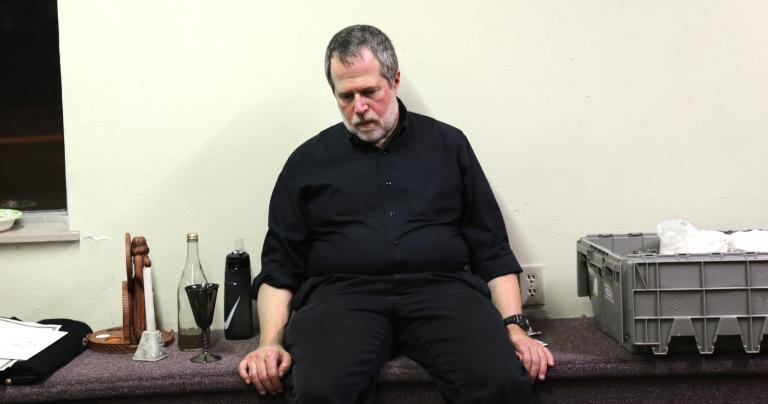
Who is calling you to be Their priest?
You can lead a coven or a grove or a CUUPS group without being a priest of any deity. Or rather, maybe you can, but I couldn’t. It isn’t that being a sworn priest provides me with any authority – it doesn’t – but rather that my priestly connections provide the spiritual support I need to do the work of serving my community.
Who is calling you to be Their priest? There may be many deities in your life – who is first? What have They asked you to do? If this is to be an oathed relationship – and it probably will be – take care that you fully understand what you’re signing up for.
If you want to be a priest but feel no specific calling, you can pursue one. It’s always good to honor the Gods. If you start praying, meditating, and making offerings, you’re likely to get Someone’s attention. That’s not guaranteed to turn into a priestly relationship, but it often happens.
On the other hand, this can’t be forced. You can ask anyone out for a date, but they have to say yes or there’s no date. And just because they say yes to a date doesn’t mean they’ll say yes to a marriage proposal.
If you want to be polytheist priest, the first step is to form and maintain a solid devotional relationship with a deity.
How are you going to make a living?
The fact that everyone who isn’t born rich is forced to sell their time to keep from starving and being homeless is an indictment of modern Western society – especially in this country. On the other hand, this is reality as it is. We don’t have to like it but we do have to deal with it.
There is no path to making a living as Pagan or polytheist clergy like there is for Christian clergy. Perhaps that will change at some point in the future, but no one who feels called to this path should count on it.
I had a very bad experience growing up in the Baptist church, but one of the helpful things I learned was the concept of bivocationalism. This is a term used for someone who serves as ordained clergy but who also works a regular job in the secular world. Early in my career I worked with an engineer who was also the pastor of a very small Baptist church. There were times when he’d say “I can’t work late on Wednesdays – I have to preach.” I’ve followed this model in my own priesthood – my paying work supports my sacred work.
Choose your secular career wisely. Professions that require a massive commitment of time (like law and medicine) will make it difficult to serve as a priest. Religious discrimination is illegal, but Pagans teaching in public schools generally have to keep a low profile. I’ve spent my entire career in a corporate environment – that’s worked well for me. The hours are reasonable (mostly – there was a time when they weren’t) and if you do good work nobody cares what religion you practice (again, mostly – there are unfortunate exceptions).
In 2021 I wrote a “graduation speech” titled How You Make a Living and How You Make a Life are Two Different Things. I strongly encourage you to read it, and then figure out how to apply it to your life and your calling.
Do you need certification?
If you want to be a Unitarian Universalist minister, you need to be credentialed by the UUA Ministerial Fellowship Committee. That’s a long process, and one of the key requirements is earning an M.Div. – a Masters of Divinity degree.
There is no such requirement for Pagans and polytheists. But our wider society often expects religious professionals to be certified, by somebody – especially if you want to be accepted as clergy by other clergy in an interfaith setting.
Cherry Hill Seminary is an online Pagan institution that awards the M. Div. degree, as well as Masters degrees in pastoral counseling and Pagan Studies. It is not currently accredited – seminary accreditation is a long and expensive endeavor, and that’s before you get to the Christian assumptions of accrediting agencies. If you want to do the things that Cherry Hill trains people for doing, check it out. But that may not be the best route for polytheist priests.
You will likely need an ordination to be able to legally perform weddings. Requirements vary widely by state, and even more widely outside the United States. The Universal Life Church will suffice in many states – it’s quick, easy, and cheap. I wanted an earned ordination – I’m not sure my specific path is still open. ADF offers clergy training and certification. It’s not quick and easy, but it is good training to become a functioning polytheist priest.
I encourage prospective clergy to focus first on what you’re going to do and how you’re doing to do it. Then figure out what certifications you need, and how to get them.
What community will you serve?
You can be a solitary priest, and many priests are solitary. But the title of “clergy” presumes community service. What community will you serve?
Here, the congregationalist model is helpful, even though it’s a Christian idea. UUs use this model. While ministers are credentialed by the UUA, they are ordained by their congregation. It follows the concept that ministers are people who are “called out” and “set aside” – their authority comes from the people they serve.
My own working priesthood happened through this model. I joined Denton CUUPS as an ordinary member. After a while I was elected to an officer’s position. Because I wanted to fulfill my obligations to the best of my ability, I sought out training: formal training from OBOD (who does not ordain), and informal training from local UU and interfaith groups (on things like pastoral counseling). I served 12 years as Coordinating Officer of Denton CUUPS – that role enabled me to participate in things like the National Day of Prayer.
If you want to be polytheist clergy, find a polytheist community and become an active participant. Don’t worry about what they call you – just do what needs to be done. Make yourself available and the work will find you.
For all my certifications, for all the notoriety that being a published author brings, I am clergy because people in my community call me when they need priestly work, and they call me because I’ve shown that I can and will do it.
Do the work and the titles will follow. Only you won’t care much about the titles, because you’ll know that what really matters is the work.
Who will be your elders?
I cannot overemphasize the need for all clergy, all priests, all leaders to have one or more elders: someone you can go to for counseling and advice, and someone who will hold you accountable to your commitments and to the standards you’ve set for yourself.
Working in a CUUPS group, I’m accountable to the Board of Trustees of Denton UU. But they’re not capable of providing spiritual counsel. Over the years I’ve developed close relationships with a small handful of Pagan leaders – they’re experienced people I trust. I don’t talk to them often, but they’re there when I need them.
Religious and spiritual leaders who are accountable to no one often go off the rails, sometime tragically so.
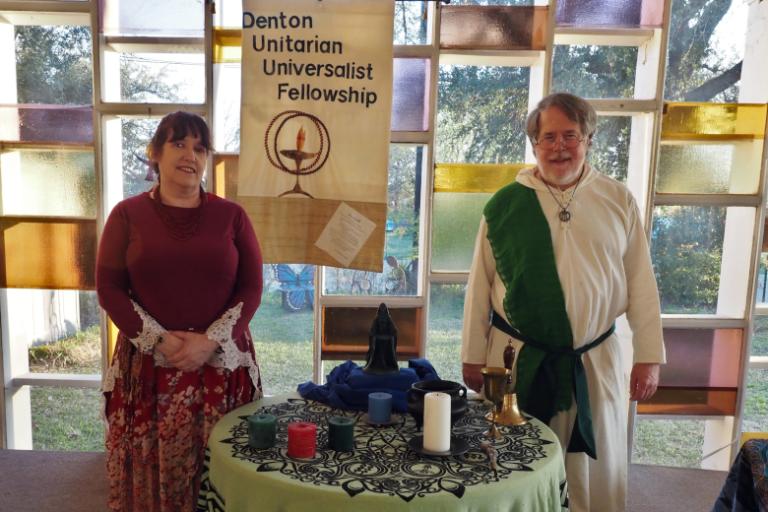
This is holy work
Being a priest and serving as clergy is hard work. It takes training, study, and practice to learn to do it well. It takes commitment and determination to keep doing it when things get challenging and difficult. It is tiring and often thankless.
And it is holy work.
Serving your Gods and maintaining good relationships with Them. Mediating for Them and helping others to find the information they need. Serving your community and promoting Pagan values and virtues. This is where I’ve found meaning in life.
Blessings and good luck on your path forward.
For further reading
I’ve written a fair amount on Pagan priesthood over the years. Put “priest” and “priesthood” and “Pagan priesthood” in the search block and you’ll find plenty. Here are a few posts I think would be especially helpful that I haven’t already linked to in the body of this piece.
Priesthood – A Modern Pagan View (2014)
What I Can Do For You as a Priest, and What I Can’t (2018)
15 Roles of Pagan Priesthood – How Many Is Too Many? (2019)
Priesthood as Service to the Gods (2019)
Priesthood Over A Lifetime (2019)


